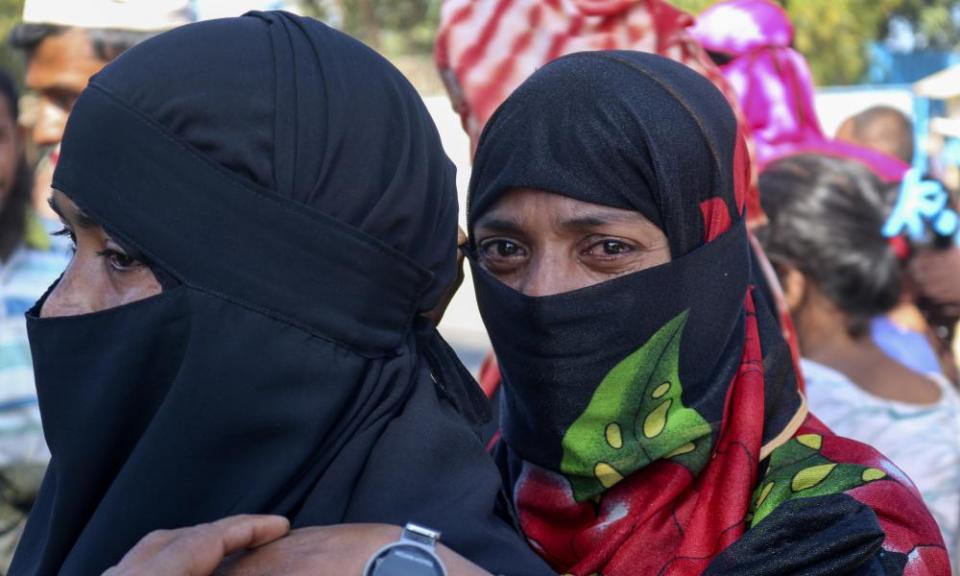Bangladesh begins moving Rohingya families to remote island

Bangladesh has begun moving Rohingya families from camps near the Myanmar border to a settlement on a remote island, despite concerns about its safety and a lack of consent from the refugees.
More than 1,600 Rohingya refugees set sail on Friday from Bangladesh’s southern port of Chittagong for the remote island of Bhasan Char in the Bay of Bengal, a naval official said, Reuters reported.
The official said the Rohingya were aboard seven boats, with two more carrying supplies.
Related: Justice and the Rohingya people are the losers in Asia's new cold war
Around 1,000 people had already been moved, regional police chief Anwar Hossain told AFP.
Bangladesh said it planned to move 2,500 families but rights groups say refugees have been listed without their consent. They called on Bangladesh to halt the relocation to allow an independent inspection of the island.
Saad Hammadi, Amnesty International’s south Asia campaigner, said: “It is crucial that the Bangladeshi authorities let the UN, rights groups and humanitarian agencies carry out independent assessments of Bhashan Char’s habitability first before taking any steps to relocate people there. No relocation plan, either to Bhashan Char or to another location, can be undertaken without the full and informed consent of the individuals involved.”
Refugees in Kutupalong say people are worried, staying close to their homes since the relocations started, and that all transport inside the camps has been banned by the authorities.
Since April around 300 Rohingya have been living on Bhasan Char, sent there after being picked up at sea. There have been allegations made against guards of sexual assault, and videos have emerged of women screaming to be allowed to return to the mainland after Bangladesh took a delegation of camp leaders, known as majhis, to visit the island in September.
Formed from a buildup of silt in the Bay of Bengal only 20 years ago, Bhasan Char’s exposure to extreme weather and distance from the mainland in emergencies have caused concern since Bangladesh first raised the idea in 2015.
The Rohingya themselves had firmly resisted being moved but since 700,000 more refugees arrived three years ago fleeing Myanmar’s ethnic cleanings, many have tired of the conditions in the crowded settlements.
Mohammad Hanif, 40, a majhi in Kutupalong camp, the world’s largest refugee camp, said: “We went to the island and I am pretty satisfied with the arrangements there. They have better housing, mosques and madrasas, markets. And the government promised there’ll be no lack of aid and support from the UN and other agencies.”
Hanif said his wife and children had been concerned about moving but were convinced after he told them about the facilities available.
He said they were told that the same NGOs operating in the mainland camps would also help on Bhasan Char. However, the UN has not yet agreed to work on the island, and in a statement Wednesday UNHCR said it had not been involved in the relocations and called on Bangladesh to allow an urgent assessment of the island.
Bangladesh has insisted the new housing on Bhasan Char is superior tothe Cox’s Bazar bamboo shelters, and that it has built flood defences.
“We were told there will be members of Bangladeshi authorities too in the island. So whatever odds we’ll be facing in the island, the Bangladeshis will face it too … so I think the island must have facilities to survive under bad climate condition,” said Hanif. “The authorities told us that Bangladeshi government has done so much for us and they gave us shelter and food, they expect us to follow their plan. Because it is for our own good.”
Human Rights Watch and the Bangkok-based advocacy group Fortify Rights said they had spoken to refugees who had been in hiding since being told their names were on the lists for relocation. They also warned of majhis making false promises and threats to force consent.
Mohammad Anis, 33, said he had decided against going because he did not want to remain in Bangladesh long term. “I don’t want to go to the island. And no one I know from my block wants to go either,” said Anis, a majhi in Kutupalong. “We don’t believe they can force this many people to relocate against their will under the watch of the international community. Our demand is only rational and that is to get us back to Myanmar, we don’t want to be refugees all our life.”
There are more than a million Rohingya refugees living in the Cox’s Bazar region, having arrived after repeated surges of violence in Myanmar’s Rakhine state since the early 1990s.

